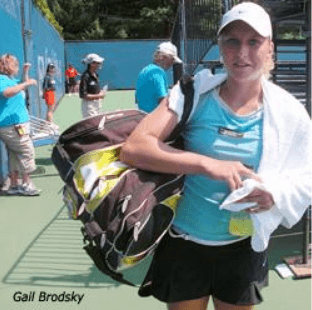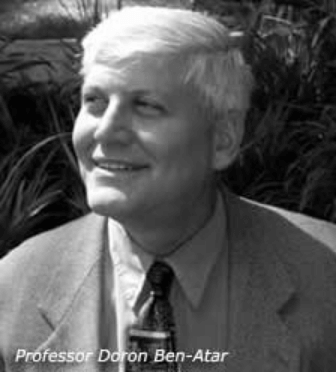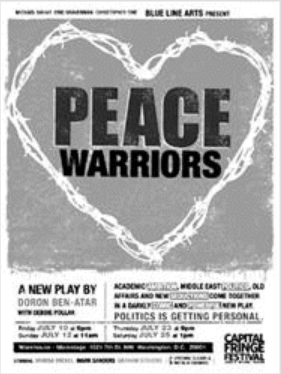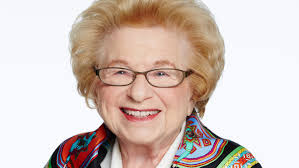Freelance writer Howard Blasreports on the Pilot Pen Tennis Tournie in New Haven – from a Jewish perspective. The tournament was still in full swing as the Ledger went to press.

Ezra Academy makes a night of it
Ezra Academy of Woodbridge joined thousands of fans at the Pilot Pen Tennis tournament that kicked off at the Connecticut Tennis Center at Yale on August 23 and will run through August 29. According to Head of School, Rabbi Amanda Brodie, “This year at Ezra, we are highlighting health and fitness for life. Ezra parents, Jody Ellant and Howard Reiter, responded to an offer for $1 Pilot Pen tickets and purchased 180 for the evening session on Monday, August 24, which they made available to the Ezra community.” Ellant notes, “We, as a family, have attended the Pilot Pen tournament since its inception. The Pilot Pen tournament is a fabulous opportunity to see world class athletes perform right here in our community. It is a wonderful way to begin the school year.”
Israelis in the Pilot Pen Draw…almost
Ezra also came out to celebrate an historic year for Israel’s tennis professionals. Israel’s Dudi Sela, currently ranked 34th in the world, was invited to play in the Pilot Pen but pulled out after dropping out of last week’s Western and Southern Financial Group tournament in Cincinnati, Oh. The 24-year old Sela, who played in last year’s Pilot Pen, aggravated a groin injury and dropped out in the second set of his first round match. He hopes to recover in time for the upcoming U.S. Open in New York.
Shahar Peer, ranked 58th in the world, and recovering from a stress fracture earlier in the summer, came to New Haven after reaching the third round of the Rogers Cup in Toronto. Peer was not given an automatic invitation to the tournament; such invitations were only issued to the top 44 ranked females. The 22-year old Peer played late in the afternoon of August 21 versus Italy’s Tathiana Garbin in the first round of the qualifiers. She was down 7-5, 2-2 in Friday’s qualifying match before a rainstorm suspended the match. Several hours later, and after eight ball kids used high powered blowers to dry the court, Garbin and Peer resumed their match in an empty stadium. Garbin defeated Peer 7-5, 6-4. Peer left New Haven early Monday morning for New York where she will prepare for the U.S. Open.

Israel doubles specialists, Andy Ram and Jonathan Erlich, familiar faces in New Haven after appearing in several recent Pilot Pens, did not play this year.
This has been a year of successes and stressful moments for Israeli tennis. In July, Israel stunned the tennis world when it clinched a berth in the semifinal of the 2009 Davis Cup. A capacity crowd of 11,000 fans witnessed the doubles team of Andy Ram and Jonathan Erlich, as they defeated Russians Marat Safin and Igor Kunitsyn, 6-3, 6-4, 6-7(3), 4-6, 6-4. One day earlier, Harel Levy, ranked 210 in the world, defeated Igor Andreev in the opening match of the Davis Cup and 33rd ranked Dudi Sela defeated Russian Mikhail Youzhny.
Four months earlier, the Israeli tennis team competed against host Sweden in Malmo, Sweden. Due to concerns that violent protests would erupt over Israel’s actions in Gaza, the indoor arena was left empty. In that tournament, Dudi Sela defeated former Australian Open Champion,Thomas Johansson, 3-6, 6-1, 4-6, 6-4, 6-2, and Harel Levy outlasted Swede, Andreas Vinciguerra, 6-4, 4-6, 6-4, 3-6, 8-6, in a three and a half hour match.
In February, Shahar Peer made headlines when the United Arab Emirates denied her a visa, making it impossible for her to play in the Dubai championship. In response, the Sony Ericsson WTA Tour levied an unprecedented series of fines, penalties and warnings against the tournament. Peer received $44,245, an average of the prize-money she received for singles and doubles at events last year; the tournament was fined a record $300,000 for a breach of tour rules and the event will have to post a $2 million financial performance guarantee by July 1 for a number of conditions it must meet to stage the event in 2010, including the guarantee of a wild card for Peer if her ranking is not high enough for a place in the main draw.
The response from the women’s game marks a watershed. Larry Scott, the tour’s chief executive officer, said: “These actions send a clear message that we will not tolerate discrimination and we will not allow this situation to happen again.”
The United Arab Emirates then gave “special permission” for Andy Ram, then the number 11 ranked doubles player in the world, to be granted a visa so that he could play in an event in Dubai the following week.
Young Jewish players in the Pilot Pen qualifiers
Three of the 32 players in the female qualifying singles tournament are Jewish. In addition to Shahar Peer, Rachel Kahan and Gail Brodsky vied for spots in the main draw. Kahan, a home-schooled high school senior from Unionville, received a wild card into the qualifying tournament of the Pilot Pen after winning the Prequalifier-Yale Summer Championships. After losing the first four games to Romanian Monica Niculescu, Kahan, dressed in black shorts, shirt and cap, battled back to lose the first set 6-4. Niculescu ultimately won 6-4, 6-0.
Gail Brodsky, 18, who was born in the Ukraine and moved with her parents to Brooklyn, N.Y. 12 years ago, fought hard in her qualifying match, but lost to Italy’s Roberta Vinci, 6-0, 6-1. The home-schooled Brodsky has been training at the Weil Tennis Academy in California. She tells the Ledger that this is her first time in New Haven, and that she will soon move to Melbourne, Fla. Brodsky notes that the Jewish players are “friendly with each other.”
Jesse Levine, who lost in last year’s fourth round to Pilot Pen finalist, Mardy Fish, lost in the first round of qualifier singles and therefore is not in the main draw. Scott Lipsky made it to the main draw for men’s doubles with partner, Robert Kendrick.






